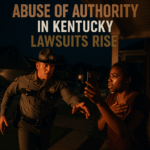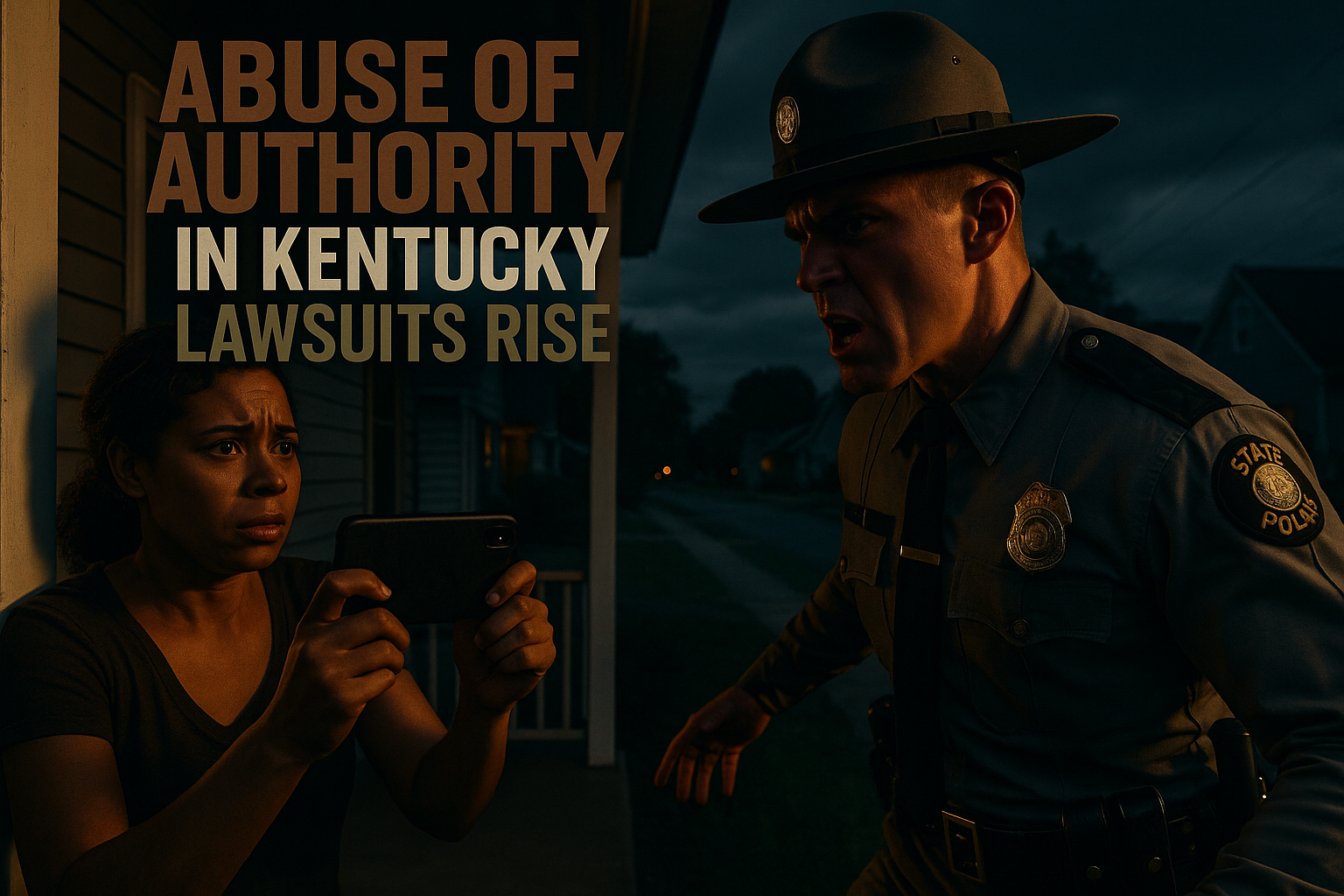

Kentucky Trooper Lawsuits Unpacked
By Darius Spearman (africanelements)
Support African Elements at patreon.com/africanelements and hear recent news in a single playlist. Additionally, you can gain early access to ad-free video content.
Kentucky Trooper Faces Lawsuits
Kentucky State Trooper Myron Jackson is facing multiple lawsuits. These lawsuits allege abuse of authority. They also include charges of obstructing governmental operations. Christen Johnson, a mother of three, filed one such lawsuit against the Kentucky State Police (KSP) (lex18.com). This followed a July 2024 traffic stop. She was arrested after coming outside her home to ask about her mother’s traffic stop (lex18.com).
Johnson’s lawsuit claims Trooper Jackson ordered her back inside her house. He then arrested her for obstructing governmental operations and resisting arrest. This happened when she began recording the incident from her porch (lex18.com). The arrest of Christen Johnson occurred on July 31, 2024. Trooper Jackson had pulled over her mother for what he believed were expired tags. However, the tags were not expired (lex18.com).
Understanding Obstruction Charges
Kentucky law defines “obstructing governmental operations” as intentionally hindering a governmental function. This involves using or threatening violence, force, or physical interference. Kentucky Revised Statute § 519.020 states this clearly (casetext.com). This statute does not apply to avoiding compliance without affirmative interference. It also does not apply to obstructing unlawful actions by a public servant. Hindering an arrest is also not covered (law.justia.com). Obstructing governmental operations is a Class A misdemeanor in Kentucky (casetext.com).
The legal definition of “obstructing governmental operations” is quite specific. It focuses on active interference with official duties. This means simply refusing to answer questions, or recording an interaction, would not typically meet the legal standard for obstruction. The law requires a physical act or threat that directly hinders a government function. This distinction is crucial for understanding the charges against Johnson. Her actions, recording from her porch, are generally protected under constitutional rights. Therefore, the charge of obstruction in her case raises serious questions about its application.
Obstructing Governmental Operations
Obstructing Governmental Operations in Kentucky means intentionally hindering a government function. This must involve violence, force, or physical interference. It does not apply to simply avoiding compliance or recording police activity. This charge is a Class A misdemeanor.
Allegations of Excessive Force
Trooper Jackson’s actions during the July 2024 incident with Christen Johnson are detailed in her lawsuit. These include allegations of excessive force. Body camera footage shows Christen Johnson coming outside to see what was happening. Trooper Myron Jackson told her, “Hello, go back inside for me” (lex18.com). Johnson’s lawsuit claims Trooper Jackson grabbed her wrists. He forced her hands behind her back. He then placed her in handcuffs after she asserted her right to record (lex18.com).
The lawsuit further alleges that Trooper Jackson yanked Johnson’s arm. This caused her to fall onto gravel. She was dragged while handcuffed, resulting in scrapes and bruises (lex18.com). Johnson’s lawsuit also states that Trooper Jackson pushed her on her hands and knees into the back of his patrol vehicle. He did not seatbelt her (lex18.com). These actions, if proven, suggest a disregard for proper procedure and citizen safety. They also highlight a pattern of behavior that raises concerns about police conduct.
Constitutional Rights at Stake
The lawsuit filed by Christen Johnson against Trooper Jackson and Trooper Jason Briscoe includes various allegations. These include constitutional rights violations and other offenses. The lawsuit accuses both troopers of violating Johnson’s First and Fourth Amendment rights (lex18.com). The First Amendment protects freedom of speech, including the right to record police activity in public. The Fourth Amendment protects against unreasonable searches and seizures. This includes protection from false arrest. Johnson’s lawsuit claims her arrest was unlawful because she was exercising her right to record (courier-journal.com).
Other allegations in the lawsuit include battery, malicious prosecution, false arrest, and intentional infliction of emotional distress (lex18.com). Battery refers to harmful or offensive physical contact. Malicious prosecution involves initiating a criminal proceeding without probable cause and with malice. False arrest means being taken into custody without legal justification. Intentional infliction of emotional distress involves extreme and outrageous conduct causing severe emotional suffering. These claims highlight the serious nature of the alleged misconduct. They also underscore the potential for significant harm to individuals when police abuse their authority.
First and Fourth Amendment Rights
The First Amendment protects freedom of speech, including the right to record police. The Fourth Amendment protects against unreasonable searches and seizures, including false arrest. These rights are central to the lawsuit against Trooper Jackson.
KSP’s History of Misconduct
The Kentucky State Police (KSP) is currently facing multiple lawsuits. They have acknowledged internal investigations regarding alleged misconduct by its troopers. While a comprehensive history of KSP’s culture and disciplinary practices is not detailed, recent events indicate ongoing issues with excessive force and alleged wrongful actions. KSP has launched an internal investigation regarding the incident involving Johnson (lex18.com). This internal review is a critical step. However, its effectiveness depends on transparency and accountability.
A former Kentucky State Trooper of the Year is at the center of a federal lawsuit and federal indictment. This is after multiple allegations of using excessive force (wlky.com). Three current or former Kentucky State Police troopers have been indicted for allegedly beating people and using unreasonable force (wdrb.com). Two current troopers involved in the indictments were suspended effective March 4. This suspension is pending the outcome of the criminal case. KSP stated its commitment to upholding high standards (kentucky.com). These incidents suggest a systemic issue within the KSP. They also highlight the need for greater oversight and reform.
Body Camera Footage and Evidence
Body camera footage is mentioned as being relevant to the incidents involving KSP troopers. This is particularly true in cases of alleged excessive force. While the content of the footage related to Johnson’s case is not detailed, it is noted that a sergeant reviewed body camera footage in her case. Johnson’s mother called 911 during the incident. She spoke with Sgt. Briscoe. He reviewed the body camera footage. He informed Johnson’s mother he would not interfere with the arrest (lex18.com). This review, however, did not prevent the arrest. This raises questions about the interpretation of the footage.
A Hardin County man’s encounter with Trooper James Wright was caught on body camera video. This is relevant to a lawsuit alleging excessive force (wlky.com). The existence of body camera footage is crucial for transparency. It provides an objective record of events. However, the interpretation of this footage can vary. This highlights the importance of independent review and public access to such evidence. The footage can either corroborate or contradict claims made by both officers and citizens. Its proper use is vital for accountability.
Status of Lawsuits
The provided search results indicate that the lawsuits against the Kentucky State Police and its troopers are ongoing. While specific timelines for resolution are not given, the articles confirm that legal proceedings are in progress. KSP stated they are unable to comment further on Johnson’s case. This is due to the ongoing legal matter (lex18.com). This is a common practice in legal cases. However, it leaves the public without immediate answers.
The lawsuit against the indicted KSP trooper is ongoing. The trooper faces up to 25 years in prison for federal charges (wlky.com). The legal process can be lengthy. It involves discovery, motions, and potentially trials. The outcomes of these lawsuits will have significant implications. They could lead to financial damages for the state. They could also lead to policy changes within the KSP. The resolution of these cases will be closely watched by the public. Especially by those concerned about police accountability.
Current Lawsuit Status
Probable Cause and Arrest Standards
The provided search results do not explain what constitutes probable cause for arrest in Kentucky. They also do not detail how Johnson’s arrest might have failed to meet this standard. The lawsuit alleges false arrest. This implies a lack of probable cause. However, the legal standard itself is not detailed. Probable cause is a critical legal concept. It requires officers to have sufficient reason to believe a crime has been committed. This standard protects citizens from arbitrary arrests. Without probable cause, an arrest is unlawful.
The lawsuit seeks punitive damages for false arrest (lex18.com). This claim suggests that Trooper Jackson lacked the necessary legal justification for Johnson’s arrest. If Johnson was merely recording from her porch, without physically interfering, her actions would likely not meet the probable cause standard for obstruction. The absence of a clear explanation of probable cause leaves readers to infer the legal basis of the false arrest claim. This also highlights a gap in the reporting.
Use of Force Policies
The provided search results do not discuss specific Kentucky State Police policies on the use of force. They also do not detail how Trooper Jackson’s alleged actions compare to these standards. However, the articles do highlight allegations of excessive force against other KSP troopers. This suggests a broader issue. A federal lawsuit and indictment against a former “Trooper of the Year” involve multiple allegations of using excessive force (wlky.com). This indicates that the problem extends beyond individual incidents.
Three current or former KSP troopers have been indicted for allegedly beating people and using unreasonable force (wdrb.com). These incidents raise serious questions about KSP’s training and oversight. They also raise questions about its commitment to de-escalation. The lack of information on specific use of force policies makes it difficult to assess the extent of the problem. It also makes it difficult to determine whether current policies are adequate. Understanding these policies is crucial for evaluating police conduct. It is also crucial for advocating for necessary reforms.
Community Impact and Reforms
The provided search results do not address the community impact of these incidents and lawsuits. This is particularly true for African American residents. Nor do they mention public responses or proposed reforms. The focus of the articles is on the legal aspects of the individual cases. However, incidents of alleged police misconduct can have a profound impact on communities. They can erode trust in law enforcement. They can also create fear and resentment. This is especially true in communities that have historically experienced disproportionate policing.
The lack of discussion on community impact is a significant omission. It overlooks the human element of these events. It also overlooks the broader societal implications. When police actions lead to lawsuits and allegations of abuse, it affects more than just the individuals involved. It affects the entire community’s sense of safety and justice. Public responses, such as protests or calls for reform, are often a direct result of such incidents. Addressing these issues requires a holistic approach. This includes legal accountability, policy changes, and community engagement. It also requires a commitment to addressing systemic issues within law enforcement.
ABOUT THE AUTHOR
Darius Spearman has been a professor of Black Studies at San Diego City College since 2007. He is the author of several books, including Between The Color Lines: A History of African Americans on the California Frontier Through 1890. You can visit Darius online at africanelements.org.
